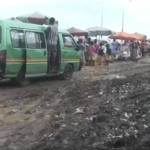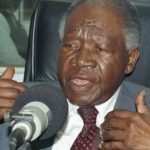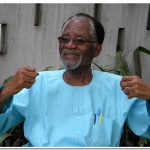The Role of Diasporans in African Development
Posted by By Akogun Akomolafe at 4 September, at 14 : 01 PM Print
Warning: count(): Parameter must be an array or an object that implements Countable in /home/alaye/public_html/wp-content/themes/Video/single_blog.php on line 46
Warning: count(): Parameter must be an array or an object that implements Countable in /home/alaye/public_html/wp-content/themes/Video/single_blog.php on line 56
Femi Akomolafe
‘Each generation must, out of relative obscurity, discover its mission, fulfill it, or betray it.’ – Frantz Fanon
“When you have to call your former master back to do basic things for you, you are not free, you have re-enslaved or recolonized yourself. We spend too much time celebrating, too much time with our fists in the air, too much time talking about Black Power (without having any of it…) We have made white hotels rich by having our conferences there. All of the conferences that Black people have each year would allow us to build ten major hotels at once. We could employ each other. We could raise our own food; it would be much better if we could stop eating out of the can all the time… The concept of nation responsibility. This is what has been taking away from us during these five hundred years. This is the supreme tragedy on our mind in the world Christopher Columbus did not discover, programming our mind to convince us that we could not even make a safety pin… There are Africans educated in Africa with Africa money who are scattered all over the world; they want to be anything but Africans. They have turned Africa into a bunch of thugs. Coup after coup after coup. I maintain that there is no solution for African people, except for some form of Pan African Nationalism, no matter how you cut it… We stop apologizing, stop imitating and began to innovate. For a people to be free, they have to produce one sacrificial generation. This generation must be the role model for other generations to come. Maybe a generation will have to wear dungarees so that another generation can wear tuxedos. We have not yet considered that. How do we become a whole people again? I think we should begin by finding a mirror and liking what we see. We are hung up with so many off-beat religions – none of which we created – we’re cutting each other to pieces, – deserting each other, destroying each other based on ideologies of no consequences to us as a people… We have to realize it is not the effort of any one of us that will lead to freedom, but the collective work of all of us who are sincere.” – John Henrik Clarke
On the 14th and 21st of August this year (2015), I was a guest on the RAZO 105.2FM station in Amsterdam.
I was there on the first day to present my two books (see details below) to the African Diaspora in the Netherlands. I had a good presentation, with many interactive calls. It gladdens the heart greatly to realize that many Africans share in my beliefs and accept the messages of the books.
On the second day, I was one of three panelists, with a brief to discuss the role Africans in the Diaspora can play in the continent’s development. A brother from Ghana and another from DR Congo completed the panel.
It was a subject very dear to my heart, as I had been privileged to be a member of the Diaspora during my sojourn in Europe.
I used my apportioned time to share my personal experience with the audience. I touched on what I believe we Africans continue to do wrong and some of the things we can do to change things around.
I had spent a good part of my money and time in Europe preaching a message to my African brothers and sisters who, for one reason or the other, find themselves in the strange world of Europe: the message was that no matter our station of life in Europe, we should never forget the society we left behind in Africa. I also preached that we should learn from the Europeans and the Asians who, wherever they find themselves, look for resources to take back to improve their societies.
To spread the message, I started the first African Bulletin Board System (AFRO-BBS) in the Netherlands. And together with a brother from Guyana, Zar, I published the first black newspaper in the Netherlands, The African.
We wrote, we preached, we exhorted, we proclaimed. At great expense, we traveled the length and breadth of the Netherlands, Belgium, and Germany. In short, we did all our possible best to wake our people up to their responsibilities to their societies. To make them come together, form an organization strong enough to protect them against police brutalities, and serve as a conduit for the social, economic and cultural development of Africa.
Sadly, it was all wasted efforts, as our people refused to read our newspaper or listen to our preachment. Few bothered to buy our newspaper. We watched as our people sipped expensive Cognac, and plead poverty to pay a few Guilders for the paper. Those that have regularized their residence permit thought it was not their problem, and considered us busy-bodies. Those without the magical permit said that they were too busy making a living to care.
Today, almost thirty years later, our people in the Netherlands are still mired in ignorance and poverty. Most of them are still doing the same shitty jobs they were doing almost thirty years ago. They still clean the toilets, the train, the bus stations, and Schiphol airport. Today, many of them suffer from one debilitating disease or the other. Many have ended up at Old People’s Homes.
When I visit them, many say that I was a Prophet.
I don’t think of myself as a prophet; I just try to read up on history and try to let historical lessons guide me.
The tragedy of our people in the diaspora is a microcosm of the ailment plaguing our great continent.
Somewhere along the line, we lost our sense of community. We forgot all the great lessons our ancestors taught us. We forgot our philosophy of Ubuntu. We forgot the spirit of Harambee. We became too greedy, too selfish and too individualistic.
Many of us have overlearned lessons from other cultures. To many of us, life is simply all about ME, ME, ME!
We see all the evidence we need around us. We see it in the numbers of very expensive jeeps on our un-motorable roads. We see it in people having fleets of limousines in their garages, whilst the road leading to their expensive houses are in deplorable state. We see it in the number of ultra-luxurious mansions our people put up right next to dreadful ghettoes.
The Netherlands has one of the best highways in the world, but there I see less 4-wheel jeeps than in Ghana.
The reason is simple: a Dutch person will invest in establishing a profit-yielding business before he will consider buying an expensive car or build a high-class mansion. He will think of investing in the future than in today’s gratification.
I know many people in the Diaspora who have expensive cars parked in Ghana, which they use only on their once-in-two-years holidays. I know quite a few of us in the Diaspora who have no ongoing business project in Ghana, but happily pay upward of GHC60,000 (600 million old Ghana cedis) to clear their expensive cars from Tema.
We can calculate how many new businesses that gargantuan sum can finance. We can calculate how many of our people we can gainfully employ with just one of those jeeps.
No, we do not begrudge people enjoying their hard-on money; only that we should not bemoan when no take us seriously. We should not complain when others see us only as happy-go-lucky children – unworthy of trust or respect.
And what about those among us that claim to be businessmen? Far be it for them to engage in a productive enterprise that will benefit society, create employment and add some values to our mineral resources. Heaven forbid that they look for foreign partners to set up manufacturing companies that will process our raw materials into finished products, export them and help us earn good foreign exchange.
All we see them do is to turn themselves into giant vacuum-cleaners, sucking up all the garbage and dredges of Europe to ship back home. They ship ancient fridges, antediluvian electronics to Ghana, causing indescribable environmental and health hazards to the country. They make their money, but end up killing their compatriots and poisoning their own country.
Many of the callers to the programme were angry because successive governments in Ghana does not appear to take them seriously, despite their enormous financial contributions.
I share their sentiments, but I told them that they have no one but themselves to blame. If they find it impossible to come together to form a strong organization that will represent them, they should not blame anyone but themselves. If they allow greediness, selfishness, and egoism to becloud their sense of judgment, they have no one but themselves to blame.
Our Elders say that goods are priced the way they are presented. No government will ignore representatives of an organization that represents say, 10,000, or even 5,000 Ghanaians.
I told them about the interview I had with Ghana’s Foreign Minister, Madam Hannah Tetteh, in which I raised the subject of the Ghanaian Diaspora. Here is an excerpt:
Question: Minister, successive governments have paid what could be described as lip service to the question of the Ghanaian Diaspora. This is a very huge talent of highly educated men and women the country could tap into to fast-track her developmental agenda. What are you going to do in regard to the Ghanaian Diaspora?
Answer: I honestly do not believe that Ghanaians in the Diaspora are entitled to any special dispensation.
What we shall try to do as a government is to try and create a viable environment for every Ghanaian, irrespective of where they reside, to realise his or her full potentials.
I also have heard the Diasporan clamour to be given certain entitlements because they said that they have helped with remittances and such.
I don’t think that citizens are entitled to special treatment on the basis of remittances that were sent to mainly family members and for their personal expenses.
However, what is important is to engage with them to see how an appropriate means for them to be able to contribute to national development could be arrived at.
What I think is that it is very important to engage with them, and have a structured dialogue to see how best this can be done.
I think that there can be incentives for them in return for direct contributions to national development and progress. They could do this by contributing with skills they have acquired.
I am not at all against incentives that make it interesting and worth their while to contribute more formally and directly to our growth and development. It would make a world of difference!
For instance, if some of our medical professionals outside could be encouraged to come and work in our hospitals from time to time and make it possible for people to have specialist medical care, and for that to happen the terms of this kind of assistance/contribution would have to be defined, and the incentives to be given must be clear
This is not the only area where I think Ghanaians in the diaspora can make a contribution; it is just an example.
This kind of arrangement can only be arrived at through a process of dialogue/discussion and agreement and that is what I meant by I would be having an “engagement” with Ghanaians in the diaspora on this matter.
I just don’t believe that the basis for any special consideration should be remittances to friends and family.”
End of interview.
What needs to be done?
It was obvious from the call-ins that every African was anguished by the sad state of the continent. Everyone agreed that Africa is in terrible shape and needs urgent action to fix her numerous problems.
My suggestions were the same I canvassed in my books: that I do not believe that Africa has a problem that cannot be fixed by a change of mentality. What we need in Africa is a mental revolution.
What we noticed in all the societies that lifted themselves up from poverty was the conscious efforts by the people to do something about their terrible state. People became both patriotic and passionate about changing their society for the better.
Patriotism is essential as it helps people to develop a deep love for their country. With this comes the commitment to stop all the society-destroying negative traits. To put the country’s interests first.
Few things are accomplished until there exists a deep passion to succeed.
Africa cannot succeed unless and until enough of her children become patriotic and passionately committed to seeing her succeed.
From Marcus Garvey to Kwame Nkrumah, people have told us that our future is firmly in our hands. The future, they say, belongs to those that prepare for it today. Our Elders told us that however successful we are, as individuals, unless and until we successfully build a strong Black Nation, we shall, collectively, be considered a failure. The Wretched of the Earth.
About the Author
Femi Akomolafe is a passionate Pan-Africanist. A columnist for the Accra-based Daily Dispatch newspaper and ModernGhana, and Correspondent for the New African magazine, Femi lives in both Europe and Africa and writes regularly on Africa-related issues for various newspapers and magazines.
Femi was the producer of the FOCUS ON AFRICANS TV Interview programme for the MultiTV Station.
He is also the Man and Machine Coordinator at Alaye Dot Biz Limited, a Kasoa-based Multimedia organization that specializes in Audio and Video Production. He loves to shoot and edit video documentaries.
His highly-acclaimed books (“Africa: Destroyed by the gods,” “Africa: It shall be well,” “18 African Fables & Moonlight Stories” and “Ghana: Basic Facts + More”) are available for sales at the following bookshops/offices:
- Freedom Bookshop, near Apollo Theatre, Accra.
- WEB Dubois Pan-African Centre, Accra
- Ghana Writers Association office, PAWA House, Roman Ridge, Accra.
- Afia Beach Hotel, Accra
Where to buy them online:
On Lulu Books:
18 African Fables & Moonlight Stories https://goo.gl/Skohtn
Ghana: Basic Facts + More: https://goo.gl/73ni99
Africa: Destroyed by the gods: https://goo.gl/HHmFfr
Africa: It shall be well: https://goo.gl/KIMcIm
Africa: it shall be well
on Kindle books: https://www.createspace.com/4820404
on Amazon books: http://goo.gl/QeFxbl
on Lulu Books: https://goo.gl/SQeoKD
Africa: Destroyed by the gods
on Kindle books: https://www.createspace.com/4811974
18 African Fables & Short Stories: https://goo.gl/s9tWAf
on Amazon books: http://goo.gl/1z97ND
on Lulu Books: http://goo.gl/KIMcIm
My Lulu Books page: http://www.lulu.com/spotlight/FemiAkomolafe
Get free promotional materials here:
- Africa: it shall be well: http://alaye.biz/africa-it-shall-be-well-introduction-in-pdf/
A FREE Chapter of ‘Africa: It shall be well’ can be downloaded here: http://alaye.biz/africa-it-shall-be-well-a-free-chapter/
- Africa: Destroyed by the gods (How religiosity destroyed Africa) http://alaye.biz/africa-destroyed-by-the-gods-introduction/
A FREE Chapter of ‘Africa: Destroyed by the gods’ can be downloaded here: http://alaye.biz/africa-destroyed-by-the-gods-free-chapter/
Femi’s Blog: www.alaye.biz/category/blog
Website: www.alaye.biz
Femi on Amazon https://www.amazon.com/author/femiakomolafe
Femi Akomolafe’s Lulu Books page: http://www.lulu.com/spotlight/FemiAkomolafe
Twitter: www.twitter.com/ekitiparapo
Facebook: https://www.facebook.com/FemiAlaye
Gmail+: https://plus.google.com/112798710915807967908;
LinkedIn: www.linkedin.com/in/femiakomolafe;
YouTube Channel: https://www.youtube.com/user/fakomolafe
Email: fakomolafe@gmail.com
Profile on New African magazine: http://newafricanmagazine.com/tag/femi-akomolafe/
Alayedotbiz, Blog, Book Review, Interviews, News, Polemics, Random Musings, Satire




